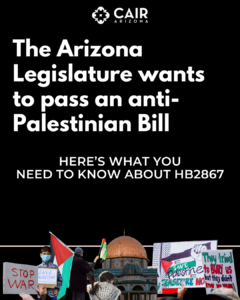CAIR-AZ: Arizona businesses rank among worst for religious discrimination complaints
Mike Sunnucks, Phoenix Business Journal, 12 April 2013
Full Article (Subscription Required): http://www.bizjournals.com/phoenix/print-edition/2013/04/12/arizona-businesses-rank-among-worst.html
Connie Bibb and Usama Shami are worlds apart when it comes to faith and religion.
Bibb, an evangelical Christian, is the pastor’s wife at the Pentecostals of Phoenix Church. Shami, a devout Muslim, is chairman of the Islamic Community Center of Phoenix.
But both said they welcome opportunities to share their faiths with co-workers and business associates if they are approached — and both avoid proselytizing at work.
“I honestly don’t recall ever hearing my co-workers speak of faith in a negative way. Many of them share basic beliefs and are very reverent of Christian principles,” said Bibb, who has worked for 30 years in the private sector.
They are like the millions of other workers in Phoenix and nationwide who have strong religious beliefs — but in Arizona, that can mean workplace challenges as the state has become one of the leaders in religious workplace discrimination complaints. Between 2009 and 2012, the U.S. Equal Employment Opportunity Commission pursued 532 religious discrimination cases in Arizona, ranking the state ninth highest in the U.S. during that time frame.
Arizona had 178 religious discrimination claims last year, the seventh-highest number in the country. More religious discrimination lawsuits were brought in Arizona in 2012 than in more populous states such as Illinois, Ohio and Pennsylvania.
Those conflicts have cost U.S. employers $110 million in damages between 1997 and 2012. The EEOC does not record financial damages on a state-by-state basis.
Imraan Siddiqi, Arizona Chapter spokesman for the Council on American-Islamic Relations, believes many lower-paid service workers and immigrants do not have the time or resources to file complaints.
“It is for this reason that many, possibly the majority, of workplace discrimination goes unreported,” Siddiqi said.



